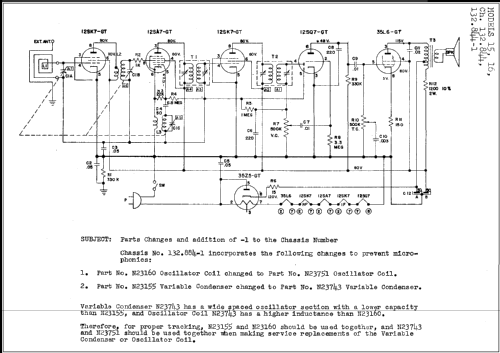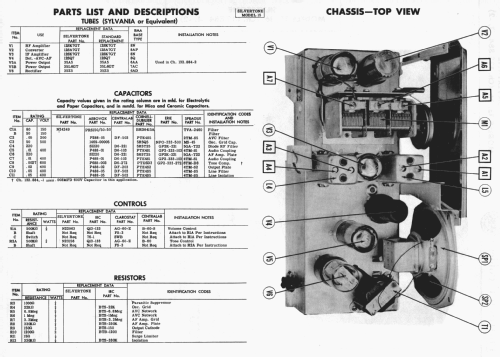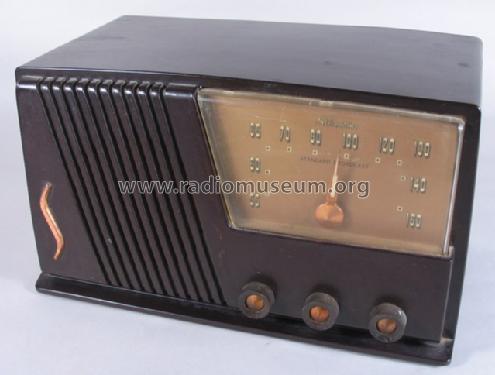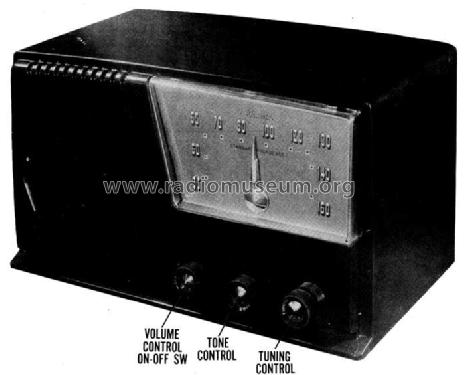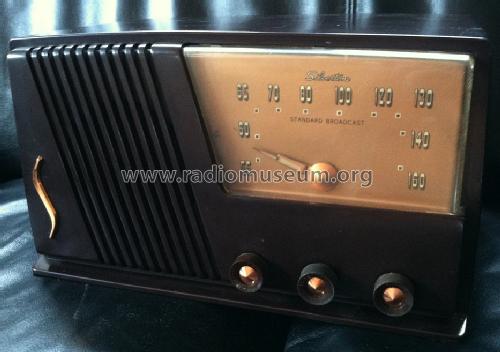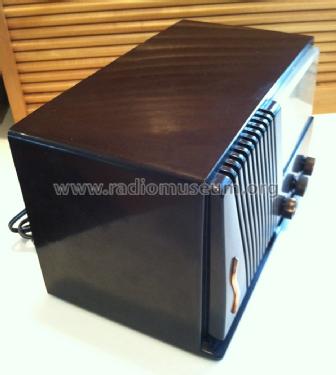Silvertone 15 Ch= 132.844 Order=57K 015
Sears, Roebuck & Co.; Chicago (IL)
- Country
- United States of America (USA)
- Manufacturer / Brand
- Sears, Roebuck & Co.; Chicago (IL)
- Year
- 1951

- Category
- Broadcast Receiver - or past WW2 Tuner
- Radiomuseum.org ID
- 55853
-
- Brand: Silvertone
Click on the schematic thumbnail to request the schematic as a free document.
- Number of Tubes
- 6
- Main principle
- Superhet with RF-stage; ZF/IF 455 kHz; 2 AF stage(s)
- Tuned circuits
- 7 AM circuit(s)
- Wave bands
- Broadcast only (MW).
- Power type and voltage
- AC/DC-set / 115 Volt
- Loudspeaker
- Permanent Magnet Dynamic (PDyn) Loudspeaker (moving coil) / Ø 5 inch = 12.7 cm
- Power out
- 1 W (unknown quality)
- Material
- Plastics (no bakelite or catalin)
- from Radiomuseum.org
- Model: Silvertone 15 Ch= 132.844 Order=57K 015 - Sears, Roebuck & Co.; Chicago
- Shape
- Tablemodel without push buttons, Mantel/Midget/Compact up to 14
- Dimensions (WHD)
- 12.75 x 7.375 x 7 inch / 324 x 187 x 178 mm
- Notes
-
Case in brown color. See the many different chassis for this same cabinet and where they come from.
- Price in first year of sale
- 25.95 $
- External source of data
- Ernst Erb
- Source of data
- The Radio Collector's Directory and Price Guide 1921 - 1965
- Circuit diagram reference
- Rider's Perpetual, Volume 22, covering 1951
- Mentioned in
- Collector's Guide to Antique Radios 4. Edition
- Literature/Schematics (1)
- Machine Age to Jet Age II
- Literature/Schematics (3)
- Sears, Roebuck Catalogs (Silvertone) (Spring & Summer 1951, page 646. Fall/Winter 1951, page 796.)
- Literature/Schematics (4)
- Sears, Roebuck Catalogs (Silvertone) (Mid-Season/Fall 1951, page 288.)
- Other Models
-
Here you find 5482 models, 3214 with images and 4188 with schematics for wireless sets etc. In French: TSF for Télégraphie sans fil.
All listed radios etc. from Sears, Roebuck & Co.; Chicago (IL)
Forum contributions about this model: Sears, Roebuck & Co.: Silvertone 15 Ch= 132.844 Order=57K 015
Threads: 1 | Posts: 1
Sears, Roebuck & Co. gave Noblitt-Sparks Industries with its own brand "Arvin" the manufacturer code 132. You can see the manufacturer code list by member John Kusching here on post 3.
Probably 1950 Sears selected a nice looking cabinet for quite a series of different models. We know at least a 5 tube version, a 6 tube version and even an eight tube version. Here you find a similar cabinet which would fit for the cabinet for Sears: Arvin model 460T with chassis RE-284, which was available in Ivory, Willow Green and Sandelwood. Here we will not link all those Arvin models, but even around 1953/54 it seems that Noblitt Sparks has it still as 760T with chassis RE342 as 6 tube radio for broadcast only. With the chassis RE-277 and RE-277-1, Noblitt-Sparks built also AM-FM models with 8 tubes, for instance model Arvin 480TFM and 481TFM.
For Sears we find at least the following models with the same cabinet:
6 tube broadcast receivers:
Silvertone 15 with chassis 132.844, Silvertone 16 with chassis 132.844-1, Silvertone 15 with chassis 132.884, 132.884-1 and 132.884-2.
Probably a year later we can find a 5 tube model with broadcast and SW in the same cabinet as Silvertone 2022, chassis 132.027.
But there are also 8 tube AM-FM-models with transformer for AC only in that same cabinet, the Silvertone 18 with chassis 132.877 and the Silvertone 20 with chassis 132.877.
I wrote this article because I found at eBay a model "Silvertone Catalog # 18 AM/FM Bakelite Tube Radio", for which I created a new model page. I believe now that it belongs to Silvertone 18, chassis 132.877, but with this analysis I could find quite a family with this cabinet. I will link this text to the named models. For each a user can get this common information.
What is still in question is:
Is this really a Bakelite mould or is it modern plastic?
I know that in the USA bakelite is sometimes called plastic - even in catalogs - and for getting a better price at eBay you find often the opposite: A set is called "Bakelite" but it is of plastic.
Without knowing how to test one directly on the material, one can often not distinguish. Seldom a photo can tell ...
Ernst Erb, 13.Oct.12
